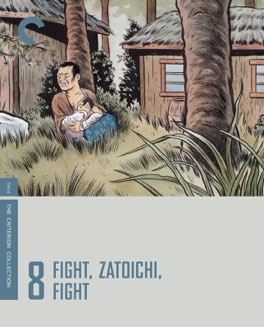KENJI MISUMI
Fight, Zatoichi, Fight
Ultimately, this is a series about loss. Due to his circumstances, Ichi will never know happiness, nor peace, nor any semblance of a normal life. His is the struggle of the road. It’s heavy stuff, and the various entries so far, this is number eight, have leaned in to this narrative to a greater or lesser degree. This one leans all the way in, to a pretty emotional effect.
The basic Zatoichi premise is that the titular character is wandering around, gets into some kind of situation with some local Yakuza, and then has to fight his way out of it. Ichi is never about violence as a means unto itself. His is the path of begrudging violence, in stark contrast to Lone Wolf and Cub, who is a literal executioner and hired killer, for example.
In this instance, Ichi is being targeted, for some reason or another, by a gang of assassins. Like, literally, I don’t think they even bother to explain why the bad guys are after Ichi. They just are. Anyway, they think he’s in a palanquin, but he’s actually given it to a mother and her son. The confusion leads to the mother being brutally murdered protecting her infant child. and Ichi determines that he will take that child back to its father in a nearby village.
Of course nothing is ever that simple in the movies, and Ichi ends up forming a bond with the child, as well as with a “mother” substitute geisha that he meets along the way. When he gets to his destination the father denies his parentage and is revealed to also be a Yakuza deadbeat. As has been the case in some of the other films, a “normal” life path is partially open to him. He can adopt the kid, marry the geisha and finally settle down.
But, of course, Ichi knows that he can’t actually make that choice. It’s not reality, it’s merely a very painful illusion. His journey is the road, not a comfortable village life of fatherhood and marriage. This long-form meditation on the nature of grief and loss is a fascinating one. I cannot imagine an American film series taking the same approach.
